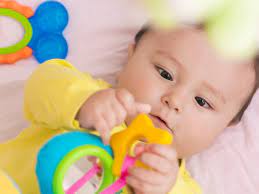The Power of Play: How Educational Toys Boost Brain Development
Play is often seen as a fun and entertaining activity. However, over the years, researchers have discovered that play is much more than just a source of enjoyment for children. In fact, play is essential for their overall development, especially when it comes to boosting brain development. And educational toys play a crucial role in facilitating this process.
Educational toys are specifically designed to stimulate the mind and enhance various cognitive skills such as problem-solving, creativity, and critical thinking. They provide a hands-on experience for children, allowing them to explore, experiment, and learn in a fun and engaging way.
One of the key reasons why educational toys are so effective in boosting brain development is that they encourage active learning. Unlike passive forms of entertainment like watching television or playing video games, educational toys require children to actively participate and engage with their surroundings. This active engagement helps to strengthen neural connections in their brains, leading to improved brain function and development.
Educational toys also promote the development of essential cognitive skills. For example, building blocks or puzzles can enhance a child’s problem-solving abilities by requiring them to think critically to find solutions. Board games teach children important social skills like taking turns, following rules, and cooperating with others. Art and craft toys encourage creativity and self-expression. Each type of educational toy targets specific areas of cognitive development, helping children build a well-rounded set of skills.

Moreover, educational toys provide opportunities for open-ended play. Open-ended play allows children to explore and create without limitations, promoting divergent thinking and imagination. For instance, a set of blocks can be used to build various structures, promoting creativity and problem-solving in new and exciting ways. This type of play encourages children to think outside the box, fostering the development of unique ideas and solutions.
Furthermore, educational toys can help children develop important motor skills. Many educational toys require fine motor skills, such as the use of small manipulative objects or precise hand-eye coordination. Activities like stacking blocks or threading beads can help children develop their fine motor skills, which are crucial for tasks like writing, drawing, and dressing themselves. Gross motor skills, such as running or jumping, can also be developed through toys that encourage physical activity, like balls or trampolines.
Additionally, educational toys can greatly contribute to the development of social and emotional skills. From board games to role-play sets, these toys foster cooperation, communication, and empathy among children. Learning to take turns, negotiate, and resolve conflicts are important social skills that can be developed through playing with others. Educational toys provide a safe and supportive environment for children to learn and practice these skills, setting a solid foundation for future social interactions.
It is important to note that educational toys are most effective when used in combination with adult involvement. Parents, educators, and caregivers play a vital role in facilitating play and guiding children’s learning experiences. By actively participating in play, adults can provide the necessary support, encouragement, and guidance to maximize the learning potential of educational toys.
Gaming Revolution: How Popular Video Games are Shaping the Industry
In conclusion, educational toys have the power to enhance brain development in children. Through active learning, they stimulate cognitive abilities, promote open-ended play, develop motor skills, and facilitate the acquisition of social and emotional skills. By understanding the importance of play and providing children with the right educational toys, we can contribute to their overall development and set them up for success in their future endeavors.

